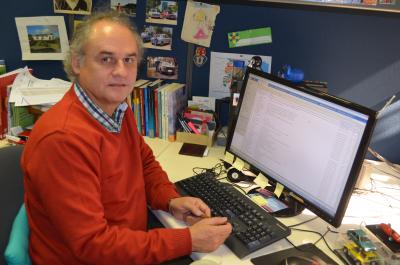
It is with deep sorrow that the Latin American and Caribbean Demographic Centre (CELADE)—Population Division of the Economic Commission for Latin America and the Caribbean (ECLAC) announces the passing of Mr. Jorge Martínez, occurred on March 17 in Santiago, Chile. With his passing, Latin America lost one of its most distinguished and internationally respected experts in international migration.
Mr. Martínez devoted virtually his entire professional career to CELADE, where he completed the Master's Program in Population and Development (1987–1988). His early work focused on internal migration, where he pioneered the use of census microdata in Chile. In the 1990s, his research turned to the demography of poverty and sociodemographic inequality. He underscored that such inequalities persisted in Latin America—even in countries with advanced demographic transitions—and called for specific public policies to address them, as they tended to reproduce themselves over time. In this context, he led a project with the Government of Chile aimed at incorporating demographic dynamics—particularly those affecting poor populations—into national policy agendas.
Upon his return to CELADE, Mr. Martínez focused his research on international migration, a field to which he dedicated himself for the remainder of his career. He became a key figure in the region through his rigorous analysis of census data, his consistent advocacy for the production of migration data to support evidence-based policymaking, and his objective, rights-based approach to the topic. His contributions were instrumental in advancing regional debates on migration and development. He offered conceptual and technical innovations on themes such as the contributions of migrants to countries of origin and destination, distinctions between intra- and extra-regional migration, the stages of the migration cycle, mixed migration flows, and transnational care chains. Mr. Martínez was also a staunch advocate for migrants' human rights and a leading voice in promoting a human rights-based approach to the study and governance of migration in Latin America and the Caribbean.
In addition to his research, Mr. Martínez was a dedicated and highly regarded lecturer. He directed CELADE's Regional Intensive Course on Demographic Analysis (CRIAD) for many years. He participated on the editorial boards of numerous academic journals. Until his retirement in 2024, he served as editor of Notas de Población, CELADE's scientific journal, helping to sustain its high standing in the region through his vision, commitment, and enthusiasm. At the time of his passing, he remained a member of the editorial committee.
He was a prominent member of the Latin American Population Association (ALAP), an organization he helped to create, serving on its first boards of directors (2005–2006 and 2007-2008) and holding various roles thereafter. He was also a member of the International Union for the Scientific Study of Population (IUSSP) and participated in several of its initiatives, including the IMILA project supported by IUSSP. He and two colleagues presented the paper "International migration and indigenous peoples in Latin America: old issues, emerging problems and the need for a multinational approach in migration policies" at the XXVI International Population Conference in Marrakech. He had been looking forward to his role as convener for the International Migration theme in the upcoming XXX International Population Conference in Brisbane, Australia and was very sad to have to pull out due to his health issues.
Shortly after the sad news of his passing became known, countless expressions of grief, recognition, and solidarity with his family, loved ones, and colleagues were received from institutions, organizations, and individuals across the region and the world. All these messages celebrated his human qualities, as were his invaluable contributions to the knowledge, analysis, and reflection on international migration and its close ties to human rights and development in Latin America and the Caribbean.
Jorge Martínez will be remembered as a colleague, teacher, and demographer who was deeply committed to knowledge, justice, and human dignity. He is survived by his children, Felipe, Daniel, and Violeta, to whom he dedicated himself with love and devotion. He will also be remembered for his passion for literature and poetry, his enthusiasm for football, and his fondness for vintage cars.
